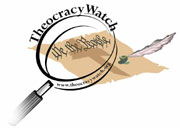
The Rise of the Religious Right
in the Republican Party
|
|||||||
|
|||||||
|
Evangelicals are very diverse and hold a wide range of beliefs. In general, they have undergone a conversion experience, often referred to as "born again." The literature generally puts the number of people who identify as evangelical at about ninety-eight million. But the term "evangelical" does not mean a certain political belief and should not be used as synonymous with the Religious Right. A New Kind of Christian, Talk To Action, November 25, 2005 -- about the Emerging Church Movement, evangelicals who oppose the Christian Right Alan Jacobs a professor of English at Wheaton College in Illinois, a leading evangelical liberal arts institution, wrote:
Mark Noll, a historian and professor of Christian thought at Wheaton College, said in an interview on the PBS documentary The Jesus Factor, featured on Frontline, "Evangelical is a slippery word ..."
Part Two: Evangelicals and Politics comes from a PBS series on AMERICA'S EVANGELICALS. Evangelicals rethink their public face The American Prospect reports on evangelicals who are reacting against the intolerance and extremism of the religious right:
The religious right supports policies such as deregulation of corporations and tax cuts for the wealthy that favor the powerful . In contrast, the Rev. Jim Wallis, editor of Sojourners magazine, is conservative theologically, yet believes his faith mandates support for progressive policies. "The Bible is full of poor people," he said. "Biblical politics has the poor at the center." Wallis describes an experience when he participated on a talk show on Fox News. Whenever you mention poverty in a venue like that, they scream that you're engaging in class warfare and promptly declare war on you. I've decided that the right wing is correct on this: There is a class war, but they and their political allies are the ones who have declared it. As Episcopal Bishop John Chane said at a recent Sojourners/Call to Renewal chapel service: "We've gone from a war on poverty to a war on the poor." Governor Bob Riley of Alabama tried to raise taxes to help the poor, calling this action his Biblical duty. On CBS News, Gov. Riley said, "we're supposed to love God, love each other, and help take care of our poor." His tax initiative was defeated in a statewide referendum, and one of the groups opposing him was the Christian Coalition of Alabama. Rev. Wayne E. Gustafson, D.Min, redefines the interpretation of "born-again" in a sermon called The Born-Again Dilemma. Two articles contradict each other about the evangelical vote: A Hidden Swing Vote: The New York Times, September 4, 2004, and South Carolina's The State.com, September 5, 2004. A Humanitarian Influence on Foreign Policy, the Washington Post, August 3, 2004 Last updated: October-2005 |
|||||||
| home | contact | about us | |||||||